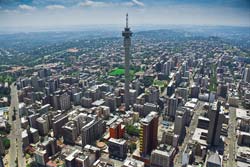South Africa is seeing an interest from corporate investors particularly in the country’s real estate, with Gauteng being a firm favourite location.

With a total office stock in its four main markets—Johannesburg, Cape Town, Durban and Pretoria—of about 168 million square feet, its total office market is comparable in size to Madrid, and greater than cities such as Brussels, Moscow and Milan, according to the report.
This is according to the Jones Lang LaSalle report entitled: Perspectives on emerging markets.
Read the report here.
According to the report, South Africa, a BRICS emerging country, is a nation poised for business growth.
It is the world’s 27th largest economy and the only African member of the G20 - with vast mineral wealth - including the world’s largest deposits of gold, platinum, chromium and manganese - and a diverse economy ranging from export automobiles to advanced financial and professional services.
International access to local markets is relatively easy through hubs such as Johannesburg, which has one of the 100 busiest airports in the world.
Though not all business conditions in South Africa are perfect, the country compares well to other emerging nations throughout the world in several key measurements, notes the report.
As an example, value-priced office stock South Africa has well-developed, quality commercial real estate stock, much of which is built to international standards.
With a total office stock in its four main markets - Johannesburg, Cape Town, Durban and Pretoria - of about 168 million square feet, its total office market is comparable in size to Madrid, and greater than cities such as Brussels, Moscow and Milan, according to the report.
Approximately 57 percent of the stock is A Grade and many of the top level office buildings are in Johannesburg, a metropolitan area of almost 4 million.
Since the Green Building Council of South Africa was launched in 2007, the nation is Africa’s sustainable office leader.
However, prime South African office space is bargain priced compared to most other desirable global cities.
At the end of 2011, prime space in Johannesburg cost an average of about $25 per square foot, lower than all the BRICS nations plus 35 major European cities.
Less attractive for businesses is a corporate tax rate of 28 percent, which ranks South Africa among the top third globally.

He says currently, corporate property investors continue to concentrate in Gauteng although infrastructural development plans could see Durban as a significant attraction to investors in the manufacturing and warehousing sector.
Johannesburg sits among the world’s top 50 business locations in terms of international corporate representation.
Fortune 500 companies with major offices or manufacturing facilities in South Africa include JP Morgan Chase, Merrill Lynch, Citibank, HSBC, Goldman Sachs, General Motors, BMW, Toshiba, IBM, Microsoft, Dell and The Coca-Cola Company. American executives enjoy the fact that, unlike other BRICS and most Euro zone nations, English is the standard, not secondary, business language.
As other nations continue to recover from the economic recession, it is anticipated that South Africa’s stability, strong macroeconomic policies and flexible exchange rates will be a major attraction to global banking and financial service companies, notes Jones Lang LaSalle.
Mark Bradford, managing director at Jones Lang LaSalle South Africa explains that South Africa is rather unique among many of its African counterparts in that investors benefit from the ownership and outright title to land.
“Many African markets prohibit or restrict private land ownership, however, our cities boast world-class infrastructure, development skills and ready access to construction materials – new developments can be constructed and delivered within acceptable time-frames unlike many parts in Africa.”
Bradford says ours is a “plug and play” environment where global corporates can quickly establish business environments not too dissimilar to those found anywhere else in the world.
Asked about what investors look for in South Africa, he says for local investors, the local private and listed property sector remains a stable vehicle in which to shelter funds.
Smaller private investors would do well to consider an investment in the listed sector as direct investment in prime property has financial barriers – property investment in secondary nodes, is cheaper but is becoming an increasingly risky bet.
Bradford points out that there is little to attract Foreign Direct Investment (FDI) into direct property ownership in South Africa.
“Put simply, South Africa real estate is expensive and the volatile Rand does little to enhance its attraction – again the listed sector offers both value and flexibility - FDI in this sector is growing,” he says.
He says currently, corporate property investors continue to concentrate in Gauteng although infrastructural development plans could see Durban as a significant attraction to investors in the manufacturing and warehousing sector.
“Investment in the South African real estate sector remains attractive primarily due to the stability of the sector.”
Rental growth may be slow but we were not witness to the collapse of the rental market as witnessed in a number of European markets, he says.
Prime nodes continue to offer investment security, though if anything they are not exiting and given the prospects of increased inflation and continued economic uncertainty, property will remain a favoured investment vehicle, he adds. – Denise Mhlanga









